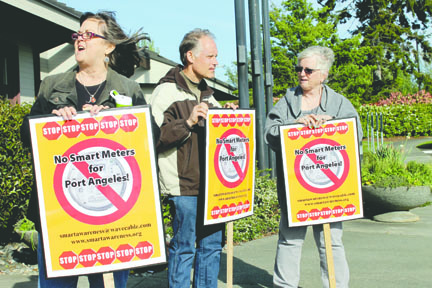PORT ANGELES — Residents holding signs opposing the city’s “smart” meter project once again greeted people as they entered City Hall on Tuesday night.
About a half-dozen people carried signs reading “No Smart Meters in Port Angeles” before the council meeting, where some spoke up in opposition.
Alan Anderson told the council he was sure more people are opposed to the project than have spoken directly to council members.
“Silence in this case does not equal consent,” Anderson said.
March meeting
At a meeting in March, between 20 and 30 people showed up with protest signs in regard to the city’s $4.9 million smart meter project, which seeks to replace the city’s analog water and electric meters with digital devices that would be read wirelessly from City Hall.
The meters also would be able to receive information from the city utility software.
Between 60 and 70 people attended a September council meeting to oppose the project.
The project has been delayed by software problems by at least two years, with the city declaring the contractor on the project, Atlanta-based Mueller Systems, in breach of contract in January.
Also speaking against the meters Tuesday was Dr. Eloise Kailin, an environmentalist.
Kailin told council members and staff that they should do further research into the health effects of the type of electromagnetic radiation the smart meters will use to communicate.
“It is important that you consult with an expert in electromagnetic radiation poisoning who is not affiliated with the electric and smart meter industry,” she said.
She also cited information counter to city staff claims that the brand of meters to be used in the smart meter project would transmit only once per day for less than a second.
Differing data
She said information presented before the Public Utilities Commission of California in November showed that these types of smart meters transmitted once every 3.4 seconds.
Phil Lusk, the city’s deputy director of power and telecommunication systems, said the city’s meters only transmit — those that are transmitting, which is about 850 — once per day, usually the evening, for 0.2 seconds.
Lusk said he had not seen the information Kailin provided but said different utilities can use different variations of the same brand of smart meter, leading to different transmission rates.
Council members did not discuss the matter during Tuesday’s meeting.
About 2,100 smart electricity meters and 1,200 smart water meters have been installed on residences and businesses across the city. All are still being read manually.
Why they’re against it
Opponents of the project say the meters violate citizens’ right to privacy and pose dangers to human health through the wireless signals they use to transmit data.
City officials have maintained that the devices will collect only utility usage data, as current analog meters do, and transmit at a fraction of the energy used by cellphones.
In tests, the meters have failed to consistently send accurate usage data from the meters to city servers, according to city consultant West Monroe Partners.
Craig Fulton, city public works and utilities director, hopes to bring an update on talks with Mueller to City Council members June 3.
________
Reporter Jeremy Schwartz can be reached at 360-452-2345, ext. 5074, or at jschwartz@peninsuladailynews.com.

